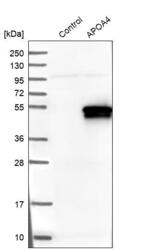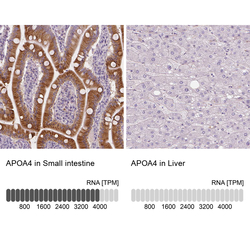Antibody data
- Antibody Data
- Antigen structure
- References [6]
- Comments [0]
- Validations
- Western blot [1]
- Immunohistochemistry [1]
Submit
Validation data
Reference
Comment
Report error
- Product number
- HPA001352 - Provider product page

- Provider
- Atlas Antibodies
- Proper citation
- Atlas Antibodies Cat#HPA001352, RRID:AB_1078179
- Product name
- Anti-APOA4
- Antibody type
- Polyclonal
- Description
- Polyclonal Antibody against Human APOA4, Gene description: apolipoprotein A-IV, Validated applications: IHC, WB, Uniprot ID: P06727, Storage: Store at +4°C for short term storage. Long time storage is recommended at -20°C.
- Reactivity
- Human
- Host
- Rabbit
- Conjugate
- Unconjugated
- Isotype
- IgG
- Vial size
- 100 µl
- Concentration
- 0.1 mg/ml
- Storage
- Store at +4°C for short term storage. Long time storage is recommended at -20°C.
- Handling
- The antibody solution should be gently mixed before use.
Submitted references A human autoimmune organoid model reveals IL-7 function in coeliac disease
Defining the Celiac Disease Transcriptome using Clinical Pathology Specimens Reveals Biologic Pathways and Supports Diagnosis
A High-throughput Bead-based Affinity Assay Enables Analysis of Genital Protein Signatures in Women At Risk of HIV Infection
Increased maternal and fetal cholesterol efflux capacity and placental CYP27A1 expression in preeclampsia
Variance decomposition of protein profiles from antibody arrays using a longitudinal twin model
Global proteomic profiling reveals altered proteomic signature in schizophrenia serum
Santos A, van Unen V, Lin Z, Chirieleison S, Ha N, Batish A, Chan J, Cedano J, Zhang E, Mu Q, Guh-Siesel A, Tomaske M, Colburg D, Varma S, Choi S, Christophersen A, Baghdasaryan A, Yost K, Karlsson K, Ha A, Li J, Dai H, Sellers Z, Chang H, Dunn J, Zhang B, Mellins E, Sollid L, Fernandez-Becker N, Davis M, Kuo C
Nature 2024;632(8024):401-410
Nature 2024;632(8024):401-410
Defining the Celiac Disease Transcriptome using Clinical Pathology Specimens Reveals Biologic Pathways and Supports Diagnosis
Loberman-Nachum N, Sosnovski K, Di Segni A, Efroni G, Braun T, BenShoshan M, Anafi L, Avivi C, Barshack I, Shouval D, Denson L, Amir A, Unger R, Weiss B, Haberman Y
Scientific Reports 2019;9(1)
Scientific Reports 2019;9(1)
A High-throughput Bead-based Affinity Assay Enables Analysis of Genital Protein Signatures in Women At Risk of HIV Infection
Månberg A, Bradley F, Qundos U, Guthrie B, Birse K, Noël-Romas L, Lindskog C, Bosire R, Kiarie J, Farquhar C, Burgener A, Nilsson P, Broliden K
Molecular & Cellular Proteomics 2019;18(3):461-476
Molecular & Cellular Proteomics 2019;18(3):461-476
Increased maternal and fetal cholesterol efflux capacity and placental CYP27A1 expression in preeclampsia
Mistry H, Kurlak L, Mansour Y, Zurkinden L, Mohaupt M, Escher G
Journal of Lipid Research 2017;58(6):1186-1195
Journal of Lipid Research 2017;58(6):1186-1195
Variance decomposition of protein profiles from antibody arrays using a longitudinal twin model
Kato B, Nicholson G, Neiman M, Rantalainen M, Holmes C, Barrett A, Uhlén M, Nilsson P, Spector T, Schwenk J
Proteome Science 2011;9(1):73
Proteome Science 2011;9(1):73
Global proteomic profiling reveals altered proteomic signature in schizophrenia serum
Levin Y, Wang L, Schwarz E, Koethe D, Leweke F, Bahn S
Molecular Psychiatry 2009;15(11):1088-1100
Molecular Psychiatry 2009;15(11):1088-1100
No comments: Submit comment
Enhanced validation
- Submitted by
- Atlas Antibodies (provider)
- Enhanced method
- Recombinant expression validation
- Main image

- Experimental details
- Western blot analysis in control (vector only transfected HEK293T lysate) and APOA4 over-expression lysate (Co-expressed with a C-terminal myc-DDK tag (~3.1 kDa) in mammalian HEK293T cells, LY424692).
- Sample type
- Human
- Protocol
- Protocol
Supportive validation
- Submitted by
- Atlas Antibodies (provider)
- Enhanced method
- Orthogonal validation
- Main image

- Experimental details
- Immunohistochemistry analysis in human small intestine and liver tissues using HPA001352 antibody. Corresponding APOA4 RNA-seq data are presented for the same tissues.
- Sample type
- Human
- Protocol
- Protocol
 Explore
Explore Validate
Validate Learn
Learn Western blot
Western blot Immunohistochemistry
Immunohistochemistry